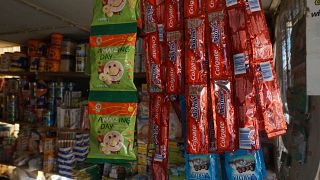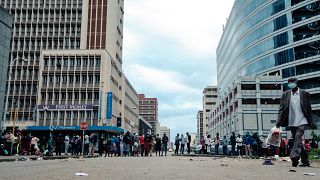Zimbabwe
Zimbabweans are finding it increasingly difficult to make ends meet. Since the start of the war in Ukraine, Zimbabwe's inflation rate has shot up from 66% to more than 130%, according to official statistics. The war is blamed for rising fuel and food prices.
In Zimbabwe, the impact of the Ukraine war is heaping problems on the already fragile economy. The war “coupled with our historical domestic imbalances, has created challenges in terms of economic instability seen through the currency volatility and spilling over into price volatility,” Finance Minister Mthuli Ncube told Parliament in May.
Teachers “can no longer afford bread and other basics, this is too much,” tweeted the Progressive Teachers Union of Zimbabwe in early June. The three largest teachers' unions are demanding the government pay their salaries in U.S. dollars because their pay in local currency is “eroded overnight.”
“Because of high inflation, the local currency is collapsing,” economic analyst Prosper Chitambara told The Associated Press. “Individuals and companies no longer trust the local currency and that has put pressure on the demand for U.S. dollars. The Ukraine war is simply exacerbating an already difficult situation.”
Many fear Zimbabwe could return to the hyperinflation of 2008 which reached 500 billion%, according to the International Monetary Fund. At that time, plastic bags full of 100 trillion Zimbabwe dollar banknotes were not enough to buy basic groceries.
The economic catastrophe forced then-President Robert Mugabe to form a “unity government” with the opposition and adopt a multi-currency system in 2009 in which US dollars and the South African rand were accepted as legal tender.
The U.S. dollar continues to dominate with prices in local currency often benchmarked to the rates for the American currency on the flourishing illegal market, where most individuals and companies get their foreign currency.
Across the country, currency traders line the streets and crowd entrances to shopping centers waving wads of both the local currency and U.S dollars.
Many Zimbabweans who earn in local currency such as government workers are forced to source dollars on the illegal market, where exchange rates are soaring, to pay for goods and services that are increasingly being charged in U.S. dollars.
Retailers said the rising rates for U.S. dollars on the illegal market are forcing them to frequently increase prices, often every few days, to allow them to restock.
Promising better days ahead, Ncube, the finance minister, said the government “will not hesitate to act and intervene to cushion against price increases and exchange rate volatility.”
Many are skeptical of such vows from the government, saying nothing short of a miracle will pull Zimbabwe out of its economic crisis. Even while coping with constantly rising prices, many can’t help making grim jokes about the situation.












02:09
In a bid to aid its economy, Lebanon hopes to return to golden age of tourism
01:09
Egypt: Inflation forecast to have climbed further in May
01:08
OECD revises forecast, projects slowdown in global economic growth
Go to video
To avoid conflicts with locals, Zimbabwe tracks elephants with GPS
Go to video
Putin hosts talks with African leaders on security
11:14
Power Play or Partnership? America’s Strategy in Africa [Business Africa]